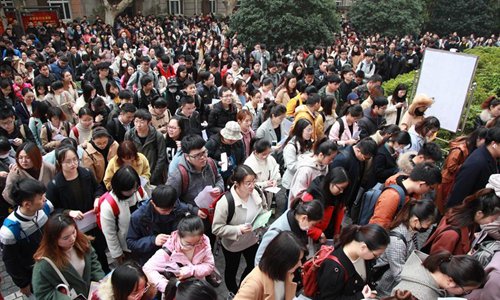HOME >> OPINION
West has to understand and appreciate China’s system
By Li Qingqing Source:Global Times Published: 2019/10/15 21:33:40

Candidates enter the examination rooms to take the national civil servant exam at Nanjing Forestry University in Nanjing, capital of East China's Jiangsu Province, December 2, 2018. File photo: Xinhua
Many Western countries have always been misjudging China, and they criticize or even deny China's system. Instead of trying to understand China, they attribute many China-West disputes to the Chinese system. These people cannot recognize China's development only because China has a system that is different to the West. To understand China's system is an important step to understand the country's decisions and achievements.
Some people from the West do not understand how the Chinese system works. Nevertheless, they are fond of using their systems to judge and analyze Chinese politics and economy. Here is a simple question: China has rapidly grown into the second-largest economy in the world. Isn't China's system worthy of in-depth study and understanding? We would like to provide a perspective.
China started an online registration of its annual intake of civil servants on Tuesday. China's national civil servant exam is the Chinese way to recruit people who perform public duties according to laws. For the first time, China has banned those expelled from the Communist Party of China (CPC) and credit defaulters from taking the exam.
The Western misunderstanding of the Chinese system is deep. The West has failed to understand that the Chinese system has guaranteed China's stable development, and the system's operation is depended on who are operating it. Without speeches, canvassing and capital operations, China's strict and fair civil servant recruitment system guarantees meritocracy. This promotes the stable development of the Chinese system and the increasing national strength.
Francis Fukuyama, a renowned American political scientist, said in an interview that "China really invented modern bureaucracy in the Qin (221BC-206BC) and Han (206BC-220AD) dynasties, with relatively impersonal forms of official selections and bureaucratic rules." Over the years, the ancient Chinese tradition and China's current governance system still have similarities. The tradition of selecting the good and the capable for public services has not changed. The national civil servant exam provides the capable with an opportunity to be promoted, and guarantees that those who perform public duties are truly capable.
We have to admit that there used to be problems in the system, such as corruption. However, after the 18th National Congress of the CPC, the situation has been changed. By strengthening the system, Chinese civil servants have more political and moral qualities.
China's social credit system, a topic that Western media has been hyping, has also been included in the national civil servant exam. Many Western countries have been questioning the system, accusing the Chinese government of using the social credit system to spy on Chinese people. They do not understand China at all. The social credit system helps improve the integrity and credit level of Chinese society. Banning credit defaulters from taking the exam guarantees that Chinese civil servants are not only loyal to the Party, but also observe the law and morality.
Fukuyama also said, "I think we know relatively little empirically about how the Chinese government works." Indeed, many Western countries either are indifferent to the Chinese system, or have prejudiced it. Only after China has made great achievements have they started to think about why the Chinese system is so effective. These Western people should get rid of their stereotype and start to objectively understand the Chinese system, which is based on Oriental traditions and wisdom.
RELATED ARTICLES:
Posted in: OBSERVER